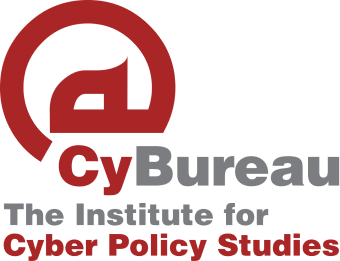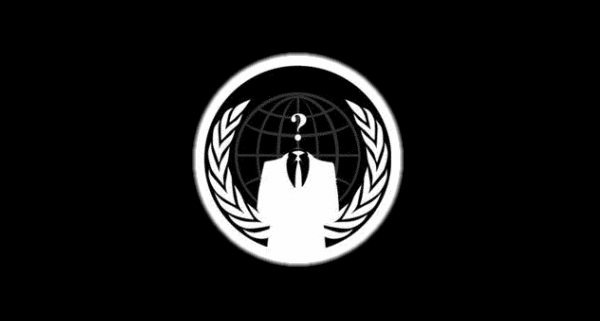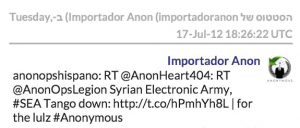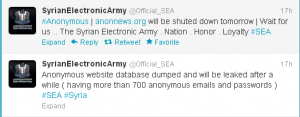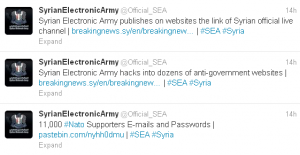Online warfare against Syria escalates
The online warfare against the Syrian regime has been taken up a notch. Alongside an increase in the physical warfare, the battles reaching into the heart of the capital, Damascus, the elimination of the most senior members of the regime and the continuing desertions, over the past two weeks, we have seen an increase in the offensive activities against Syria in the online arena as well.
Wikileaks activists have broken into senior Syrian officials’ computers and published 2.4 million email correspondences. If the elimination of senior members of the Syrian regime was a step up in the physical struggle against Assad’s administration, over the past two days there has been a similar increase in the online arena, expressed by direct offensive activity by ‘Anonymous‘ activists against the Syrian Electronic Army (SEA).
These are hackers who act in an organised fashion online against opposition activists and Arab media networks that cover the events in the country in a skewed way, in their eyes. Their activity is most often characterized by breaking into websites and by leaving messages on them, condemning the rebels and in favour of the Syrian regime. It is quite possible that they are acting under the guidance of the Syrian regime.
On 8 July, a video clip by Anonymous was published, containing a warning to the Syrian regime, following its military action against the citizens of the state and an accusation regarding its support of the SEA. The message said that Anonymous activists had decided to destroy Syria’s and the organisation’s online activity following the West’s failure to defend the country’s citizens.
On 16 July the SEA published a video in reply (in the exact same length and other characteristics), addressing Anonymous for provoking the organization and claiming that despite its repeated threats, none of them has been carried out so far. In addition, they claimed that they are not a virtual army, but a real army that cannot be stopped, while citing incidents in which they, allegedly, hacked into various Anonymous websites. Around half of the video clip is dedicated to showing various articles about an attack that was carried out on an Anonymous website.
Anonymous was quick to reply. Following the publication of the video, a DDoS attack began on the website of the SEA. The attack was first announced on media channels, belonging to Anonymous. In response, the SEA declared, in a direct communication to Anonymous, that the attack had been carried out by amateurs, via a direct dialogue through Twitter in a number or messages.
At the same time, the Syrian organisation began its own online attack against one of Anonymous’ websites (AnonPlus), while announcing that it had succeeded in obtaining personal information of 700 Anonymous activists in Holland that was uploaded and published on the internet (the original file was erased from the server and uploaded again by the Syrians at its current address). The next step was the publication of yet another video by Anonymous on the 17th, aimed directly against the SEA.
Since 18 July there has been a substantial escalation: there have been break-ins and websites have been shut down by both sides, with an emphasis on high-quality targets. After Al-Jazeera‘s Twitter account in English was hacked by the sea at the beginning of the month, the organisation has begun a wave of attacks that has been documented in its message on its website and Twitter account.
The massive attack by the SEA included breaking into Al-Jazeera’s servers and publishing hundreds of user names and passwords of the Qatari television station’s employees as well as publishing another file including over 11,000 email addresses and passwords of NATO supporters (it is possible that these were stolen in advance and published now). The next day, on 19 July, Anonymous activists published messages about an attack on Syrian government websites and took responsibility for the attacks.
The past days, especially since 18 July, have been a significant milestone in the online warfare in the Syrian arena. If until now Anonymous’ activities had been aimed against the Syrian regime in general, they now include the Syrian Electronic Army, while communicating with it directly through text and video.
The Syrian organisation on its part has begun to escalate its activities and to break into websites, steal user identification information of thousands of users, who it considers to be enemies of the regime. Over the past two days there has been a quantitative and qualitative increase in activities of online attacks against Syria, as well as attacks by Syria against those who it considers to be its internal and external enemies. The uphill battle that is being waged by the Syrian regime, ever since the explosion that killed a number of its senior officials, is taking its toll in the online world as well, where we can see the Syrian regime firing “online shots in all directions”.
This post is also available in:
עברית
